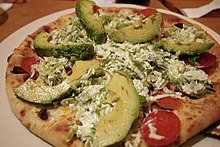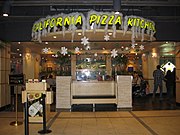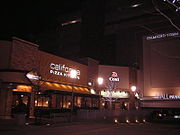California Pizza Kitchen
 | |
| Company type | Private |
|---|---|
| Nasdaq: CPKI | |
| Industry | Food and beverage |
| Genre | American Cuisine |
| Founded | 1985 |
| Founders | Rick Rosenfield Larry Flax |
| Headquarters | Costa Mesa, California, United States |
Number of locations | 184 (As of May 9, 2023)[1] |
Area served | United States Mexico South America Central America Asia-Pacific Western Asia Australia Canada |
Key people | Jeff Warne (CEO)[2] |
| Products | Pizzas, pastas, salads, small plates, and desserts |
| Services | Polished casual dining restaurant |
Number of employees | 14,000[3] |
| Subsidiaries | CPK ASAP |
| Website | www |
California Pizza Kitchen, Inc. (CPK) is an American casual dining restaurant chain that specializes in California-style pizza. The restaurant was started in 1985 by attorneys Rick Rosenfield and Larry Flax in Beverly Hills, California, United States.[4][5] California Pizza Kitchen introduced and popularized BBQ Chicken Pizza.[6]
Description
[edit]-
The Ocean Terminal, Hong Kong location at Christmastime
-
A new California Pizza Kitchen in Stamford, Connecticut
-
A California Pizza Kitchen location at Westfield Garden State Plaza in Paramus, New Jersey
The chain has over 185 locations in 32 U.S. states[7] and 10 other countries,[8] including 15 California Pizza Kitchen nontraditional, franchise concepts designed for airports, universities, and stadiums.
CPK's brand is licensed to a line of hand-tossed style, crispy thin crust, gluten-free crust, and small frozen pizzas for sale in supermarkets.[9] The brand was originally licensed to Kraft in 1999.[10] The license was assigned to Nestlé after it purchased Kraft's pizza lines in 2010.[11]
History
[edit]
In 1985, Flax and Rosenfield pooled $200,000 in bank loans and savings along with $350,000 invested from friends to lease space on Beverly Drive in Beverly Hills, California. The first menu, including the famous BBQ Chicken Pizza, was developed by Ed LaDou, then the pizza chef at Wolfgang Puck's Spago restaurant. CPK became an immediate success, and the company expanded throughout Southern California. By 1992, there were 26 CPKs.[12]
Flax and Rosenfield served as co-CEO and co-chairmen of CPK from 1985 through to 1996.[13]
In 1992, PepsiCo paid nearly $100 million for 67% of the chain, with Flax and Rosenfield each receiving $17.5 million. At the time, this was thought to be more than CPK was worth, and PepsiCo pushed to expand faster. CPK opened 15 stores in 1993, and then 28 more in the following year. This rapid expansion plan was a disaster.[why?] PepsiCo had invested tens of millions of dollars and quickly slowed expansion, and moved to cut costs. PepsiCo executives had started cutting corners by replacing fresh ingredients with frozen vegetables and cheese, a change Flax and Rosenfield later reversed.[12]
In 1997, the private equity firm Bruckmann, Rosser, Sherrill & Company bought out PepsiCo's two-thirds stake with the intention of taking CPK public in 2000, pushing for expansion to resume. Veteran restaurant executive Fred Hipp was hired to run CPK with an aggressive expansion plan, including 18 new stores in 2002, 22 in 2003, and 28 in 2004. The expansion was to be carried out by former Brinker International Vice President Tom Jenneman, under the title of chief development officer. Flax and Rosenfield remained on the board, but had no day-to-day control.[12]
In early 2003, CPK reported a 16% increase in profits, with Hipp telling analysts that CPK was in excellent financial condition. In a March 25, 2003, press release, CPK cut its first-quarter earnings estimates, which were not consistent with the forecast made just a few weeks earlier. Rosenfield investigated the numbers and discovered the positive earnings numbers Hipp had been touting were masking difficult quarters ahead. An emergency board meeting was called, Hipp and Jenneman were fired, and Flax and Rosenfield resumed control of CPK.[12]
Flax and Rosenfield served as co-CEO and co-chairmen of CPK from 2003 to 2011.[13] In 2011, CPK was acquired by an affiliate of private equity firm Golden Gate Capital,[14][15] and G. J. Hart was named president, chief executive officer, and executive chairman.[5]
In 2013, CPK started serving Gluten Intolerance Group (GIG)[16] certified gluten-free pizzas, available across all CPK locations, excluding franchise locations.[17][18][19][20]
In 2014, CPK started rolling out their "Next Chapter" locations, with modernized interiors and updated menus.[21]
In 2018, CPK added Cauliflower Pizza Crust to its menu nationwide.[22]
In July 2020, CPK filed for bankruptcy due to the COVID-19 pandemic.[23] Owner Golden Gate Capital LP had acquired the company in 2011 and lost 100% of its investment. In October 2020, the sale of the company's assets was cancelled because no party submitted a qualified bid by the sale deadline.[24] The company emerged from bankruptcy in November 2020, with significantly less debt,[25] and hired a new CFO, Judd Tirnauer.[26] In mid-2021, it reportedly hired advisors to refinance its remaining $177 million debt, which would put it in a better position for either a sale or an IPO.[27]
Countries of operation
[edit]- Australia
- Canada
- Chile
- China (Hong Kong)
- Costa Rica[28]
- Guam[29]
- India
- Japan
- Malaysia
- Mexico
- Philippines
- Singapore
- South Korea
- United Arab Emirates
- United Kingdom
- United States
See also
[edit]References
[edit]- ^ Stern, Gary (9 May 2023). "California Pizza Kitchen: Bouncing Back From Bankruptcy". Forbes.
- ^ "California Pizza Kitchen Names Jim Hyatt as CEO" (Press release). 22 January 2018. Archived from the original on 2018-01-31. Retrieved 2018-01-30.
- ^ "California Pizza Kitchen, Inc. — Private Company Information". Bloomberg. Archived from the original on May 29, 2011. Retrieved January 3, 2016.
- ^ Smith, Andrew F. (2013). The Oxford Encyclopedia of Food and Drink in America. Oxford University Press USA. p. 86. ISBN 9780199734962.
- ^ a b "About CPK". California Pizza Kitchen. Archived from the original on 2013-11-05. Retrieved November 5, 2013.
- ^ Milligan, Ceara (2021-05-10). "California Pizza Kitchen Invented This Type Of Pizza". Mashed. Retrieved 2023-04-26.
- ^ "Domestic Locations". California Pizza Kitchen. Archived from the original on January 3, 2016. Retrieved January 3, 2016.
- ^ "International Locations". California Pizza Kitchen. Archived from the original on January 3, 2016. Retrieved January 3, 2016.
- ^ "Crispy Thin Crust Frozen Pizza". CPK Frozen Pizza. California Pizza Kitchen. Archived from the original on 2015-04-19. Retrieved 2015-04-21.
- ^ Hernandez, Greg (September 14, 1999). "California Pizza Kitchen Tries the Frozen Food Aisle". Los Angeles Times. Archived from the original on December 13, 2015. Retrieved January 3, 2016.
- ^ "California Pizza Kitchen Licensing Agreement With Kraft Foods To Transition to Nestle" (PDF) (Press release). California Pizza Kitchen. January 5, 2010. Archived from the original (PDF) on October 20, 2012. Retrieved January 3, 2016.
- ^ a b c d Lacter, Mark (August 2008). "Second Helping: How the two guys who founded California Pizza Kitchen kept their unlikely partnership—and their company—alive". Los Angeles Magazine. pp. 114, 116, 118, 120, 122, 124. Archived from the original on March 4, 2016. Retrieved January 3, 2016.
- ^ a b "Principals Flax and Rosenfield". Archived from the original on February 21, 2018. Retrieved Feb 20, 2018.
- ^ "FAQs". California Pizza Kitchen. Archived from the original on 2013-01-18. Retrieved 2013-01-24.
- ^ "California Pizza Kitchen to Be Acquired by Golden Gate Capital; Stockholders to Receive $18.50 in Cash Per Share" (PDF) (Press release). California Pizza Kitchen. May 25, 2011. Archived from the original (PDF) on March 4, 2016. Retrieved January 3, 2016.
- ^ Gluten Intolerance Group
- ^ "California Pizza Kitchen Introduces New Line of Gluten-Free Pizzas" (PDF) (Press release). California Pizza Kitchen. October 16, 2013. Archived from the original (PDF) on July 10, 2014. Retrieved January 3, 2016.
- ^ "California Pizza Kitchen Launches Gluten-Free Pizzas through the Gluten-Free Food Service Certification Program". Broadway World. October 28, 2013. Archived from the original on November 5, 2013. Retrieved November 5, 2012.
- ^ "Gluten-free Pizzas" (PDF). California Pizza Kitchen. Archived from the original (PDF) on January 18, 2016. Retrieved January 3, 2016.
- ^ Buss, Dale (October 14, 2013). "California Pizza Kitchen Guarantees True Gluten-Free Dining Experience with Taste, Too". Brand Channel. Archived from the original on 15 October 2013. Retrieved 5 November 2012.
- ^ "Seek the Unique". California Pizza Kitchen. Archived from the original on 2015-04-26. Retrieved January 3, 2016.
- ^ "California Pizza Kitchen Redefines California-Style Pizza with Nationwide Launch of Cauliflower Pizza Crust – A First from a National Restaurant Brand" (Press release). 30 January 2018. Archived from the original on 2019-06-05. Retrieved 2019-06-05.
- ^ Casiraghi, Luca; Saul, Josh (July 30, 2020). "California Pizza Kitchen Latest Chain to File for Bankruptcy". Bloomberg News. Retrieved 30 July 2020.
- ^ Coley, Ben (October 2020). "Bankrupt California Pizza Kitchen Sees No Bids for its Assets". FSR magazine. Archived from the original on 2020-10-16. Retrieved 2021-11-07.
- ^ Kelso, Alicia (November 24, 2020). "California Pizza Kitchen emerges from bankruptcy with significantly less debt". Restaurant Dive. Archived from the original on 2020-11-24. Retrieved 2021-11-07.
- ^ Kelso, Alicia (November 24, 2020). "Emerging from bankruptcy, California Pizza Kitchen hires new CFO". Restaurant Dive. Archived from the original on 2020-12-17. Retrieved 2021-11-07.
- ^ Kelso, Alicia (July 26, 2021). "California Pizza Kitchen mulling sale or IPO, Bloomberg reports". Restaurant Dive. Archived from the original on 2021-07-26. Retrieved 2021-11-07.
- ^ "California Pizza Kitchen inks 2 international deals". www.pizzamarketplace.com. 2022-04-06. Retrieved 2022-05-29.
- ^ Swartz, Meghan (28 March 2019). "CPK's Pleasure Island venue offers California vibe". Archived from the original on 2019-03-30. Retrieved 2019-06-05.
External links
[edit]- Pizza chains of the United States
- Pizza franchises
- Restaurants established in 1985
- Restaurants in Los Angeles
- Companies based in Beverly Hills, California
- Restaurants in California
- Restaurant chains in the United States
- Private equity portfolio companies
- Cuisine of the Western United States
- Pizzerias in the United States
- Former PepsiCo subsidiaries
- Companies formerly listed on the Nasdaq
- 1985 establishments in California
- American companies established in 1985
- 2000 initial public offerings
- 2011 mergers and acquisitions
- Companies that filed for Chapter 11 bankruptcy in 2020
- Californian cuisine



